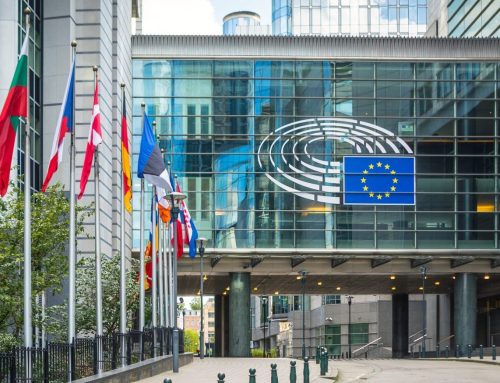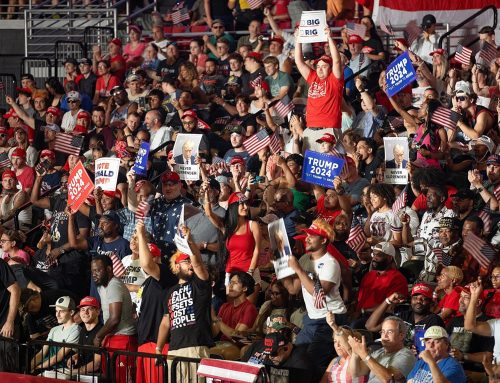Russia
Russian state media celebrated Putin’s recognition on Monday of the Donetsk People’s Republic and the Luhansk People’s Republic, sharing images of fireworks and people waving Russian flags in the regions. Russian President Vladimir Putin justified the recognition with continued claims that people in the two regions have been subjected to genocide at the hands of the Ukrainian government. Russian Foreign Minister Sergey Lavrov reiterated these claims at a joint press conference with representatives from the DRP and LPR on the 25th, saying the Donbass had previously fallen “victim to an armed aggression by the Ukrainian nationalists,” which resulted in “Russophobia and neo-Nazism” and “plunged the country into a deep tragedy.”
Putin used familiar narratives to justify Russia’s invasion of Ukraine in a speech on the 24th, in which he said that Russia could no longer ignore the atrocities in Donbass and is pursuing a special military operation to “demilitarize and denazify Ukraine.” He continued to place blame on NATO for attempting to “destroy” Russia and supporting far-right nationalists and neo-Nazis in Ukraine. And he assured Ukrainians that Russia does not intend to occupy Ukraine or infringe on their rights. Each of these narratives was commonplace throughout the week as Russian diplomats and state media attempted to justify the incursion with claims that Ukraine is full of drug addicted, war-crime-committing neo-Nazis and place blame on Ukraine for the conflict by saying it is attacking civilians and using illegal weapons, and on the West for provoking the conflict. These narratives were contrasted by stories of Russia as the peace-loving savior of Ukrainians.
When Putin ordered Russian nuclear deterrent forces to be on high alert on February 27th, Russia’s messengers jumped into motion, echoing Putin’s claim that the move is a response to NATO’s “aggressive statements against Russia” and designed to deter aggression from NATO and Ukraine—who, one RT commentator asserted, could get nuclear weapons as a result of political instability in the United States. Even as Putin declared that the alert would restore balance, Russian state media highlighted the strength of Russia’s nuclear arsenal, stating that “this is the most powerful generation of nuclear weapons.” This was a continuation of Russia’s messaging from earlier in the week, during which Putin promised to respond to Ukrainian attempts to create a nuclear arsenal. A News Front article laid out the dangers of allowing nuclear bombs to fall into the hands of the Ukrainian “cannibalistic” far right (although the article argues that the United States would never let that happen). At the same time, RT shared of the dangers of nuclear warfare from German and UN voices. This line extended to Chernobyl, where RT claimed that Russia took over the nuclear power plant to minimize the risk of Ukraine using nuclear waste for military purposes. State media and diplomatic accounts also highlighted Russian troops’ apparent partnership with the Ukrainian National Guard to protect the site.
As Russia and Ukraine negotiated terms for talks in Belarus (which will be covered in next week’s Hamilton toplines), Russian policymakers pushed responsibility onto Ukraine, with the head of the Russian delegation stating that Russia “stands for peace” and that if Ukraine refuses to talk, “the responsibility will lie entirely” with them. Russian state media also reported on comments from Belarusian President Lukashenko to attempt to validate some of the Kremlin’s talking points, including his claim that Belarus is a neutral party that supports peace; his assertion that rockets weren’t being fired from Belarus, but, in fact, gangs had smuggled rockets into Belarus from Ukraine in response to the country’s constitutional referendum; and his request that Russia deploy nuclear weapons to Belarus if any are deployed in Poland or Lithuania (state media also shared Lukashenko’s claim that that request was “fake” later in the day).
Russian propagandists attempted to clap back at Western sanctions throughout the week. At the beginning of the week, state media warned that sanctions on Russia’s energy sector would cause the international energy market to collapse and downplayed the necessity and effectiveness of sanctions. The Russian Embassy in the United Kingdom called U.K. sanctions illegal. Ahead of the announcement that Russia would be cut off from SWIFT, Russian diplomats and state media sought to reassure the public that the Bank of Russia would be able to provide banks with cash and that people’s funds would not be affected. While much of the reporting was factual, Russia’s messengers continued their push to paint the sanctions as hypocritical and damaging to the West.
RT and Sputnik responded to reports that the EU would ban the networks with their usual spark, stating that the ban “drastically reduces the liberties of EU citizens” and that the EU might as well “ban the internet.” RT Editor-in-Chief Margarita Simonyan assured workers that no one would be laid off as a result of the ban.
Russian state-media also continued to share updates of Russian military success and sentiments of international support throughout the week to bolster confidence in the operation.
China
Chinese diplomats and state media last week continued their tightrope walk around the war in Ukraine, as Chinese diplomats stopped short of explicitly supporting Russia’s invasion of Ukraine but repeatedly emphasized Moscow’s “legitimate security demands” and insisted on the “complex and unique historical context” of the crisis.
More prevalent than support for Russia, however, was criticism of the United States, with diplomats accusing the country of being the real warmonger. State media also castigated NATO for its “eastward expansion,” and also for not helping Ukraine enough.
With the Winter Olympics over, Chinese diplomats and state media devoted more time and attention to the situation in Ukraine. On the diplomatic side, the Chinese Ministry of Foreign Affairs’ (MFA) daily press conferences last week once again revealed the government’s discomfort with the conflict. On Monday and Tuesday, the MFA remained largely noncommittal while sticking to generic statements about “dialogue and negotiation.” Spokesperson Wang Wenbin was clearly under pressure from the room on Tuesday as he repeated rigid talking points in response to any Ukraine-related question.
On Wednesday, Assistant Minister of Foreign Affairs Hua Chunying fielded reporters’ questions with more pointed answers than her colleague. She criticized the United States for “creating panic,” warned Taiwanese authorities not to “exploit the Ukraine issue to their advantage,” and denounced Western sanctions on Russia. She also seemed to defend Russia’s invasion, referring to the “complicated historical background” of the Ukraine issue and pointing to U.S. interventionism in past decades. On Thursday, Hua was still at the podium with more combative than usual Western journalists. Her answers were initially measured and formulaic—“all sides [need] to exercise restraint”—but things escalated as reporters kept pushing for a more committed Chinese position. By the end of the press conference, she had covered all of China’s motives for grievances against the West, from the occupation by “the Eight-Power Allied Forces and other colonialist powers,” to the Xinjiang “lie of the century,” to Western media’s purported double standards when the United States “launched military attacks on Iraq with a vial of detergent.” Her colleague Wang Wenbin was back on Friday with very short answers pointing back to his colleague Hua’s earlier statements.
Key talking points from the MFA that were amplified by others on Twitter were that Moscow had “legitimate security demands” and that the crisis’ “complex and unique historical context” prevented any real decision. While there were no open expressions of support for Russia, there were many posts attacking the United States. MFA spokesperson Zhao Lijian, China’s Consul General in Durban, and the Chinese Embassy in Russia all pointed to the United States as the true instigator of the crisis. On the state media side, some argued NATO’s expansion was the cause of the crisis, while others criticized the organization for not doing enough to help Ukraine. And despite Chinese statements that Taiwan should not be compared to Ukraine, the Global Times still saw fit to warn the island’s officials that Ukraine shows that “Washington is not reliable.”
Tangentially related to Ukraine, many Chinese diplomats last week promoted “whataboutism” arguments about past U.S. interventions and the U.S. seizure of Afghanistan’s assets.
Finally, despite the end of the Olympics, Beijing 2022 was still the most mentioned key phrase and hashtag for both Chinese diplomats and state media last week. Most of the coverage praised the games, though many pieces continued to attack Western media’s alleged biased coverage of the event.
The views expressed in GMF publications and commentary are the views of the author alone.







